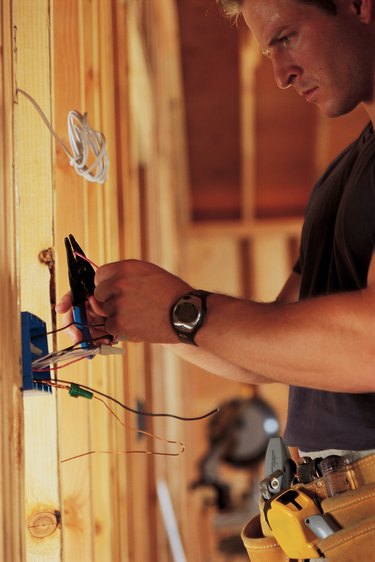
Wiring your home and running your plumbing are two significant challenges you may face in the process of building your home. However, if you can master either of these two on your own, you can save yourself some significant money in the long run. Generally speaking, no specific requirements necessarily exist saying that you have to maintain a certain distance between your electrical wires and plumbing, but there are some considerations you should make.
Consultation
Video of the Day
If you have any reservations about your ability to complete the electrical wiring or where you plan to run the wires, consult a licensed electrician and even a building inspector in your local community. Although you do not have to keep your wiring any specific distance from your plumbing, a professional in this field should be able to make some practical recommendations. Mistakes with electrical wiring can be deadly, so you need to ensure that your home is properly plumbed and wired.
Video of the Day
Electrocution
The primary concern in separating your home's electrical wiring from its plumbing is the fact that your plumbing can conduct electricity during times of severe lightning. In the event that your electrical wiring comes in contact with or is simply too close to your plumbing, it could create an electrical hazard. Should lightning strike, you and your family could be at risk if you or they happen to be near or touching a water-using appliance in the home during a storm.
Floods
The potential for broken water lines and flooding is another major consideration you need to keep in mind when trying to determine how far your plumbing and electricity should be separated. In the event of a water line break or a significant leak of another nature, it is feasible that flooding caused by the leak could cause an electrical shortage if the electrical connectors are exposed to the water.
Installation
You can install your home's wiring on your own with just a little rough planning and a few basic tools from the hardware store. As long as you know the basics of electrical wiring, how to attach a receptacle and how to run the wires to the main circuit breaker, you can complete an electrical wiring project. Plan your project in advance by drawing up a diagram of where you plan on installing each circuit. Examine the plumbing to determine where it is and keep your electrical wiring as far away as is reasonably possible. The National Electric Council does not maintain any requirements about what this distance should be. In reality, you could run the wire and the plumbing down the same stud, although this is not necessarily recommended.